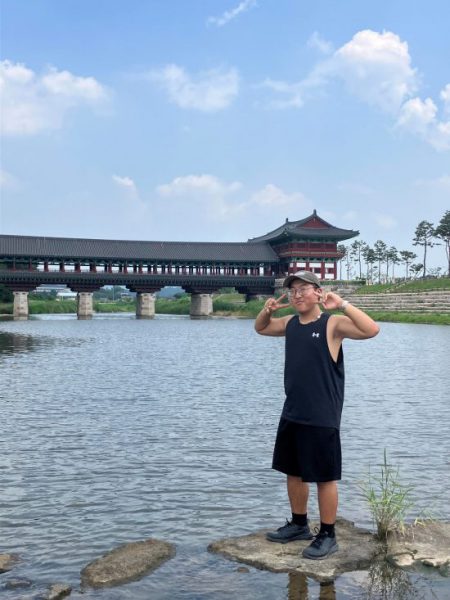Andrew Steiner|Marlin Chronicle
Andrew is a junior studying Political Science. He is the Marketing Director for Marlin Chronicle
I chose to Study Abroad for a few reasons. In high school, I had little opportunity to travel internationally so the chance to spend a full semester abroad was immensely appealing. Additionally, as an international adoptee, I have always been eager to learn about the culture that I was born into but not raised. Thus, a robust Study Abroad program was a significant factor in my decision to attend both Virginia Wesleyan University and the Batten Honors College.
Approximately a year ago, I began the Study Abroad application process, first going through the Lighthouse’s Global Scholars program and then applying to International Student Exchange Programs (ISEP) for school placement. Ultimately, I spent the entirety of the Spring 2024 semester abroad in South Korea. Some of you have never heard of ISEP, and before I went abroad neither had I. ISEP is an organization that partners with hundreds of colleges and universities worldwide to create Study Abroad experiences. With minor exceptions, VWU students must go through ISEP in order to study abroad.
I feel compelled to note that ISEP is helpful in a lot of ways, including their publication of comprehensive health and safety data and other pre-departure information. My semester at Keimyung University was perhaps the highlight of my college career thus far, and I gained knowledge and experienced character growth far beyond the classroom. Some of the relationships formed while abroad will remain with me for the rest of my life.
With that being said, ISEP does have several negatives, and I believe that VWU could take steps to both acknowledge these and to lessen their impact on our students.
One of the most pressing issues faced by students is college’s financial cost. Between tuition, housing, and various fees foisted on students, attending VWU might cost anywhere from twenty-two thousand to thirty thousand dollars a semester. While grants and scholarships certainly alleviate this burden, nearly every student is constantly worried about their finances and may be on careful budgets and tough work schedules to afford university. When I was applying to Study Abroad through ISEP, I was informed that ISEP would charge me approximately five hundred dollars solely for application and acceptance to an international university, and that they would also charge me another five hundred for ISEP’s health insurance policy, which couldn’t be waived.
My issue is not necessarily with ISEP’s fees; after all, they incur costs as well. The problem here is that these are not advertised by Virginia Wesleyan until after a student starts searching for schools through ISEP. In fact, VWU does not inform students of the upfront cost of any of its Study Abroad or Study Away courses, which might mislead students into believing that the university is covering them. Stating this information clearly on the VWU website would demonstrate honesty with students, especially for a school that advertises that 25% of its students are first generation and therefore less likely to be familiar with these programs.
On a similar note, the mandatory ISEP insurance poses problems for those studying abroad in countries that also mandate a national health insurance for foreign students. One such country is South Korea, which charges fifty to seventy dollars a month for their National Health Insurance Service (NHIS). While the NHIS can be waived with proof of adequate insurance, the process of gaining an exemption required multiple trips to an NHIS office and numerous phone calls with often unreachable ISEP coordinators. Due to the retroactive nature of the NHIS, I believe it would be far fairer for ISEP to waive their insurance requirement for students traveling to countries with NHIS policies that apply to foreigners, eliminating this headache. As an institutional ISEP partner, VWU could advocate for a change that would save its students time, money, and anxiety.
Another problem that I faced was the clear lack of communication between ISEP and VWU personnel involved with Study Abroad that translated to little to no communication with students abroad. During the four months I was abroad, I received several emails a month from my ISEP coordinator, which ordinarily would be sufficient except nearly all of these were answers to my own inquiries or email-list invitations to ISEP events. I did not receive a single email, phone call, or text from Amanda Reinig, then the Lighthouse Director, while I was abroad. Other students who went abroad have shared similar stories with me. This doesn’t reflect upon the current Lighthouse Director, Brooke Novkovic, who has undergone substantial efforts to address this problem. I included this grievance as an exhortation to Brooke and other relevant parties to continue building on these efforts to provide the proper ground support to future Marlins abroad that I never received.
None of these problems are insurmountable, and I remain optimistic that VWU and ISEP can address these flaws. By informing students of the cost of studying away or abroad, Virginia Wesleyan will avoid blindsiding students with hidden fees, eliminating the consequential frustration. VWU can also demonstrate its commitment to its students by advocating for changes within ISEP that will reduce confusion and bureaucratic distractions that interrupt otherwise life-changing experiences. Administration should also continue to support Brooke Novkovic and the Lighthouse’s efforts to positively reform their engagement with currently abroad students. As VWU’s Study Abroad program expands and both sends an unprecedented number of Marlins abroad and receives numerous international and exchange students, the identification and addressal of problems that might hinder this growth should be paramount to both VWU and ISEP.
By Andrew Steiner

